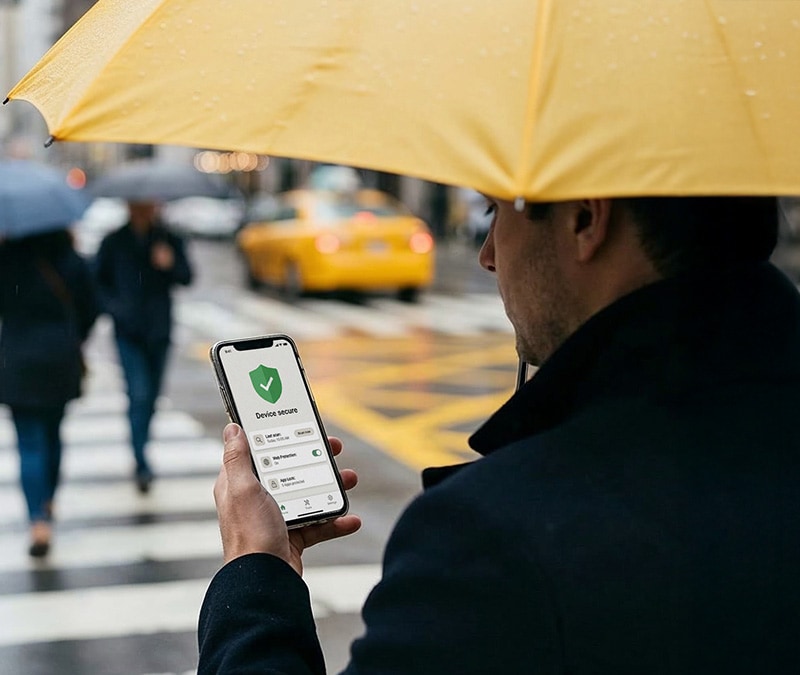Smart watches and internet security: Are my wearables secure?
Find out if your smart watch is safe or if it makes you a target for cybercriminals?

Smart watches and activity trackers have come into fashion. That’s because people are discovering the convenience of having the power of the internet within reach. So-called wearable technology can be used to control your Internet of Things (IoT) devices such as smart thermostats, TVs, and a lot more. They can also track your health and fitness activities.
The global market for wearable devices is expected to top $51.6 billion by 2022, according to a study by Markets and Markets. That means a lot of people are strapping on smart devices as the latest accessory in their internet wardrobes.
But the question remains: Are my wearables secure or could they make me a target for cybercriminals?
Risks on your wrist
Smart watches and other wearable devices act as an extension of your smartphone. They give you instant access to apps, email, text messages, and the web.
Some smart watches don’t have a stellar history when it comes to security. A quick look back: A 2015 research study directed by Hewlett-Packard found critical security issues in the top smartwatch devices at the time of the testing.
The most common problem was insufficient user authentication. Every smartwatch that was analyzed had a user interface that lacked two-factor authentication or the aptitude to freeze accounts after multiple failed password attempts.
Specific smartwatch vulnerabilities to consider
Wearable technology has come a long way since 2015, but you still might be concerned about your privacy and the security of the data these devices collect and store. Here are a few of the issues to consider.
Smartwatches collect a lot of personal data
Smart watches collect a lot of information about you. It could be the number of steps you took in a day and where you went, or financial information if your device is enabled to make payments. And the list grows, depending on the apps you've installed and the personal information you've provided.
That raises questions. Who gets to see all or part of that data? How securely is it stored? You can find some of the answers by reading the privacy policies for your smart watches and the apps you download. But keep in mind that your information is stored in the cloud — on a remote server — and there's not much you can do to prevent a potential data breach.
Your data may be sent to many third parties
Smart watches — whether it's an Apple or Android device — come with privacy policies. Reading the policy will tell you how much or how little information is shared.
For smartwatch apps, it's a good idea to not give a lot of permissions. For instance, some apps may want to access account information and your geographical location. This would be valuable information for cybercriminals if they've managed to infect your smartwatch with spyware.
Smart watches control smart-home tech
Smart watches sometimes can control smart-home technology. For instance, you may be able to use your smart-watch to unlock your front door. However, what happens if your device is lost or stolen?
Smartwatch manufacturers offer security settings that can help protect you in the case of theft. For instance, a security setting may prevent your smartwatch from being paired with any device you haven't approved. It's smart to make sure you've enabled such protection in your security settings.
Smart watches create vulnerabilities on business networks
Smart watches have plenty of business applications, from taking calls to taking notes. But do they make business networks vulnerable to hackers?
It’s possible that hacked smart watches could create threats on private networks. Consider this: A smart watch links to a mobile device, which could provide a door for cybercriminals to enter. In turn, that mobile device connects to the company network. That could lead to the exposure of valuable information.
One solution for companies? Keep smart tech on a guest network.
The convenience of smart watches — for companies and for you — is likely to drive demand. But it’s a good idea to understand the risks and take steps to help protect your information.

Cyber threats have evolved, and so have we.
Norton 360™ with LifeLock™, all-in-one, comprehensive protection against viruses, malware, identity theft, online tracking and much, much more.
Try Norton 360 with Lifelock.
Editorial note: Our articles provide educational information for you. Our offerings may not cover or protect against every type of crime, fraud, or threat we write about. Our goal is to increase awareness about Cyber Safety. Please review complete Terms during enrollment or setup. Remember that no one can prevent all identity theft or cybercrime, and that LifeLock does not monitor all transactions at all businesses. The Norton and LifeLock brands are part of Gen Digital Inc.





Want more?
Follow us for all the latest news, tips, and updates.